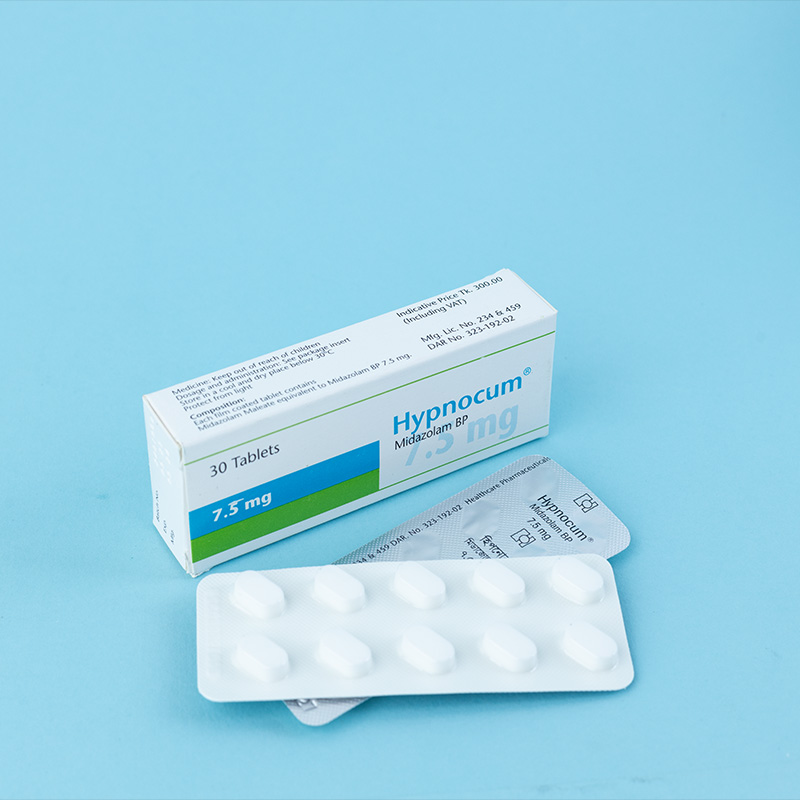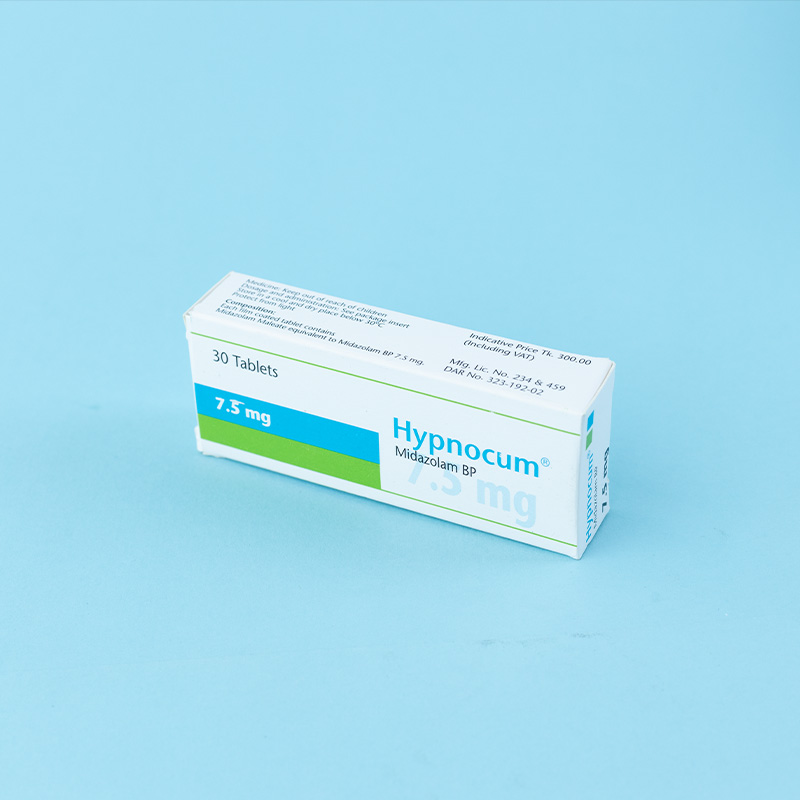Hypnocum® is a sleep-inducing agent characterized by a rapid onset and short duration of action. It also exerts an anxiolytic, anticonvulsant, and muscle-relaxant effect.

Elderly: Advanced age (above 60 years) has little or no influence on the pharmacokinetics of oral Midazolam.

Liver cirrhosis has no effect or may increase the absolute bioavailability of Midazolam due to reduced metabolism.

Short-term treatment of insomnia. Benzodiazepines are only indicated when the disorder is severe, disabling, or subjecting the individual to extreme distress.Sedation in premedication before surgical or diagnostic procedures.

Oral Dosage: For adults: 7.5-15 mg daily. In elderly and debilitated patients, the recommended dose is 7.5 mg. In premedication, 15 mg of Midazolam should be given 30-60 minutes before the procedure.
Intravenous Administration: Endoscopic or Cardiovascular procedures: In healthy adults, the initial dose is approximately 2.5 mg. In cases of severe illness and in elderly patients, the initial dose must be reduced to 1 to 1.5 mg.
Induction of anesthesia: The dose is 10-15 mg i.v.
Intramuscular Administration:
Adults: 0.07-0.1 mg/kg body weight i.m. Usual dose is about 5 mg.
Children: 0.15-0.20 mg/kg.
Elderly and debilitated patients: 0.025-0.05 mg/kg.
Rectal Administration in Children: For preoperative sedation, rectal administration of ampoule solution (0.35-0.45 mg/kg) 20-30 minutes before induction of general anesthesia.

Severe respiratory insufficiency
Severe hepatic insufficiency
Sleep apnea syndrome

Use in patients with known hypersensitivity to benzodiazepines or any component of the product

Dependence: Use of benzodiazepines and benzodiazepine-like agents may lead to the development of physical and psychological dependence on these products. The risk of dependence increases with dose and duration of treatment; it is also greater in patients with a history of alcohol or drug abuse. Once physical dependence has developed, abrupt termination of treatment will be accompanied by withdrawal symptoms. These may consist of headaches, muscle pain, extreme anxiety, tension, restlessness, confusion, and irritability.
Since the risk of withdrawal/rebound phenomena is greater after abrupt discontinuation of treatment, it is recommended that the dosage be decreased gradually.
Midazolam i.v. should be administered very slowly.

Extreme overdose may lead to coma, areflexia, cardiorespiratory depression, and apnea. The effects of overdose can be controlled by benzodiazepine antagonist flumazenil.

Insufficient data are available on Midazolam to assess its safety during pregnancy. Benzodiazepines should be avoided during pregnancy unless there is no safer alternative. Since Midazolam passes into breast milk, Hypnocum® should not be administered to breastfeeding mothers.

Drowsiness during the day
Numbed emotions
Reduced alertness
Confusion
Fatigue
Headache
Dizziness
Muscle weakness
Ataxia or double vision
These phenomena occur predominantly at the start of therapy and usually disappear with repeated administration. Amnesia: Anterograde amnesia may occur with therapeutic doses, with the risk increasing at higher dosages. Amnestic effects may be associated with inappropriate behavior.
Depression: Pre-existing depression may be unmasked during benzodiazepine use.
Dependence: Use (even at therapeutic doses) may lead to the development of physical dependence; discontinuation of therapy may result in withdrawal or rebound phenomena.

Store at a temperature not exceeding 30°C in a dry place. Protect from light.Keep medicine out of reach of children.



